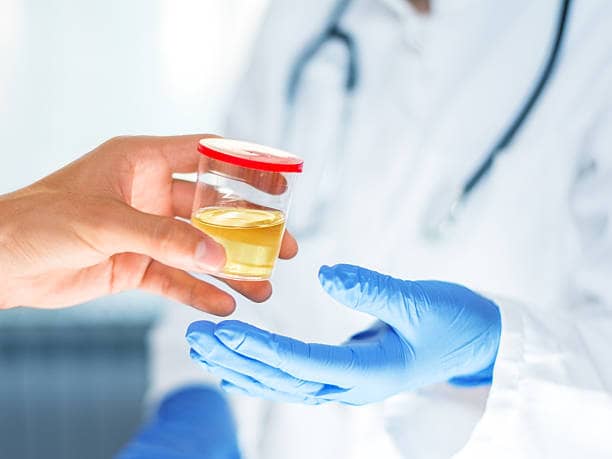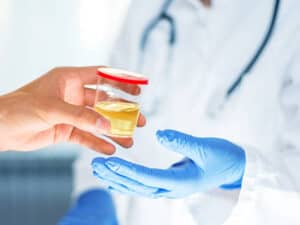Urine cytology is a laboratory-based diagnostic test that looks at a sample of your urine under a microscope to see if it contains abnormal cells. The primary objective of this test is to detect abnormal or atypical cells that may indicate the presence of urinary tract infections, inflammatory conditions, or even urinary tract cancers such as bladder cancer.

How to collect the sample?
Do not collect your urine sample first thing in the morning. The cells in your bladder can break down over time, making it difficult for a pathologist to look for certain cells under a microscope.
- When you arrive at your appointment, you will be given a sterile container to collect your urine sample.
- Wash your hands thoroughly with soap and water before collecting your urine sample.
- Use the cleansing wipes that came with your kit to clean around your genitals
- Urinate into the toilet for a few seconds and then stop.
- Restart your urinary stream using the specimen cup to collect it.
- Cap the specimen cup and give it to your healthcare provider.
Here are some additional points for preparing for a urine cytology test:
- Avoid taking any medications that could interfere with the test, such as diuretics or antibiotics.
- If you are menstruating, you may need to reschedule your test.
Sometimes once a day urine sample for 3 consecutive days might be required
How is urine cytology done?
A healthcare provider will collect a sample of your urine. The sample will then be sent to a laboratory where it will be examined under a microscope by a pathologist. The pathologist will look for abnormal cells that could be cancerous.
Why is urine cytology important?
Urine cytology is an important test for people who are at risk for bladder cancer. This includes people who have a history of bladder cancer, people who smoke, and people who work in certain industries that are exposed to chemicals that can cause cancer.
What are the benefits of urine cytology?
Urine cytology is a relatively painless and noninvasive test. It is also a cost-effective way to screen for bladder cancer.
What are the risks of urine cytology?
There are no significant risks associated with urine cytology.
What are the results of urine cytology?(Results Interpretation)
The Paris System (TPS) is used for Reporting Urinary Cytology which is a standardized, evidence-based reporting system that was developed in 2016. It is used to classify urine cytology specimens based on the presence or absence of abnormal cells.
The results of urine cytology will be reported as one of the following:
- Nondiagnostic (ND): The specimen is not adequate for evaluation.
- Negative for high-grade urothelial carcinoma (NHGUC): There are no abnormal cells present.
- Atypical urothelial cells (AUC): There are abnormal cells present, but they are not diagnostic of cancer.
- Suspicious for high-grade urothelial carcinoma (SHGUC): There are abnormal cells present that are suspicious for cancer. Further investigations are required for confirmation.
- High-grade urothelial carcinoma (HGUC): There are malignant cells present. This means that the abnormal cells in the urine sample are definitely cancerous.
- Low-grade urothelial neoplasm (LGUN): There are benign neoplastic cells present.
The TPS is designed to improve the accuracy of urine cytology reporting and to facilitate communication between pathologists and clinicians. It is a valuable tool for the early detection of bladder cancer, which is the most common type of urologic cancer in men.
What happens if my urine cytology results are positive?
If your urine cytology results are positive, you will likely need to have further testing, such as a cystoscopy, Biopsy ,CT scan. A cystoscopy is a procedure where a doctor looks inside your bladder with a thin, lighted tube.

